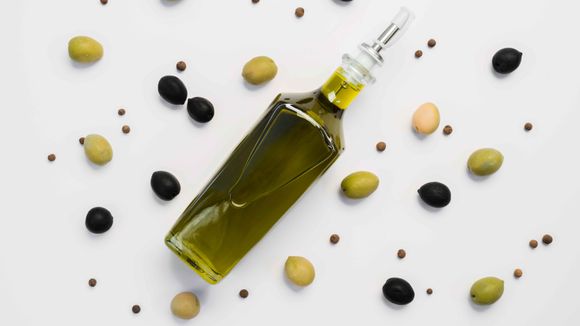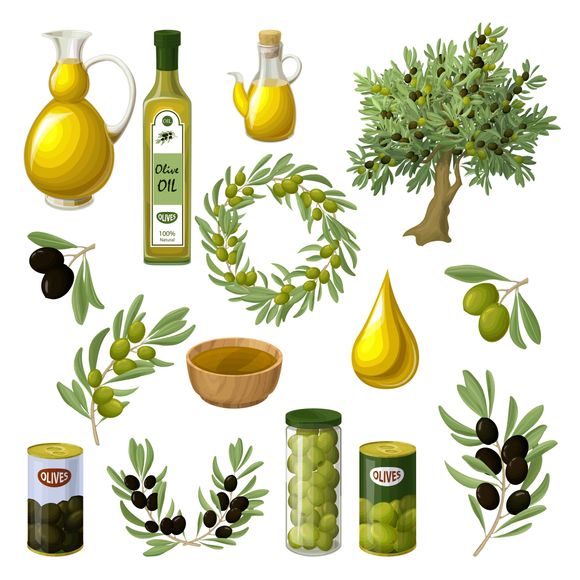The most important thing about olive oil (olive oil)
Olive oil is a type of vegetable oil extracted from the flesh of the ripe fruit of the olive tree, Olea europaea. The color of olive oil varies from transparent yellow to golden; Some varieties obtained from unripe fruits have a greenish tint. Oils with different characteristics and qualities are produced by almost every country that grows olives, with variations depending on the area and maturity of the fruit. Among the best types of olive oil are those produced in Italy, Greece and other countries.
Pure olive oil is mainly used for culinary purposes and for preserving foods, especially canned fish. It is also used in the textile industry, in the production of toilet preparations and cosmetics, in the pharmaceutical industry for medical purposes, in the production of high-quality Castilian soap and as a lubricant. [ref. 1]
Ripe olive fruits with the removed pit contain 20 to 30 percent oil depending on the climate and care of cultivation. Olive oils obtained by the first mechanical pressing without further processing are called untreated, and their quality depends on the condition of the fruit. Only oils of the best fruits are edible without further processing. They are rarely exported without processing, but can be used as a basis for export oil or consumed locally.
To prevent the formation of free fatty acids, the best quality edible oil should be removed from the pulp as soon as possible. After the initial pressing, the residual slurry is repressed with hot water and from this second pressing an oil with a higher acid content is obtained. This oil, along with lower-quality virgin oils, makes up the oil, called lampante, due to its use as a fuel in lamps. This species is further refined to remove acid, color, and odor, and is sold as refined olive oil.
Olive oil is a central component of the so-called Mediterranean diet, which is considered particularly beneficial for cardiovascular health. [ref. 2] Olive oil is rich in antioxidants, including polyphenols, and in healthy monounsaturated fatty acids. Studies of olive oil have shown that consumption of oil, especially in the form of extra virgin olive oil, is associated with a reduced risk of cardiovascular disease and type 2 diabetes mellitus, and with a reduction in brain inflammation and amyloid-beta plaque formation. These plaques are characteristic of Alzheimer's disease.
Animal and human studies have also shown that a diet rich in olive oil may help protect against memory loss and dementia-related damage. These beneficial and health-promoting effects of olive oil are due to the content of polyphenols, which have powerful antimutagenic, anti-inflammatory, antithrombotic and antiallergic effects. [ref. 3]
Types of olive oil (olive oil)

Olive oil is generally classified into four categories:
- Extra virgin - oil obtained from first pressing, which has excellent taste and smell; has a free fatty acid content, expressed as oleic acid, of not more than 0,8 grams per 100 grams;
- Virgin olive oil - Untreated oil obtained from first pressing, which has a good taste and smell; has a free fatty acid content of not more than 2.0 grams per 100 grams;
- Pure olive oil - Pure or edible mixture of refined and untreated; it is rich in vitamin E and is used only for cooking, body massages and therapies.
- Refined olive oil - It is considered an oil of medium quality. Refined olive oil is mainly used only for cooking. It is suitable for all cooking techniques, but even more so when cooking at high temperature. It has the same fat content as the above two oils.
- Pomace olive oil - The Pomace type is the lowest quality olive oil. Oilcake is obtained from the residues after the fruit pressing is completed. After the fruits are pressed, oil and water residues still remain. This oil is extracted and mixed with high quality oils to improve its quality.
Anticancer effects of olive oil
There is scientific evidence that olive oil provides protection against leukemia in children and many cancers, such as colon cancer and squamous cell cancer of the esophagus. [ref. 4] Consuming olive oil reduced the number of cancer lesions and the number of tumors, as shown in several studies. It has been observed that fatty acids present in olive oil can reduce the production of prostaglandins, which in turn can potentially inhibit the development and production of tumors.
The anticancer properties of olive oil are reassociated with its phenolic content, including hydroxytyrosol (3, 4-dihydroxyphenylethanol), (p-hydroxyphenylethanol) tyrosol and phenolic alcohols, as well as their secondary derivatives p-HPEA-EDA (oleocanthal), oleuropein, p-HPEA-EA (ligstroside aglycone), 3,4-DHPEA-EA (oleuropein aglycone) and 3,4-DHPEA-EDA. In addition, polyphenols have been shown to slow the development and progression of cancer. These polyphenols can alter the immune system by proliferation of white blood cells, as well as by the synthesis of cytokines and other factors that contribute to immunological resistance. [ref. 5]
Oleocanthal, a type of natural phenolic compounds present in extra virgin olive oil, is a strong anti-inflammatory agent. It occupies a major place in cancer prevention programs, as it can be used as a powerful inhibitor of natural cyclooxygenase (COX). Oleocantal has the ability to interrupt the inflammatory cascade by reducing the secretion of COX inflammatory enzymes. [ref. 6]
Other important health benefits of olive oil

Supports heart health
Olive oil protects against inflammation, reduces the oxidation of LDL (bad cholesterol) and improves the function of the endothelium lining the blood vessels. Manages blood clotting and lowers blood pressure.
Relieves pain and inflammation
The main cause of inflammation in the body is C-reactive protein. Also, this protein increases during conditions such as arthritis. Olive oil contains oleocanthal, which has anti-inflammatory properties and acts similarly to ibuprofen.
Improves bone health
Regular intake of olive oil is good for bone health. There is calcium to build bones and vitamin D. Daily consumption of olive oil stimulates the formation of bone tissue and prevents its breakdown.
Balances blood sugar and protects against diabetes
Olive oil contains healthy fats that are crucial for managing type 2 diabetes. The good fats in olive oil help slow down the absorption of glucose into the blood, thereby controlling blood sugar levels.
Studies have shown that olive oil has a positive effect on insulin sensitivity and blood sugar levels. The preventive properties of olive oil in this direction have been considered in a large number of studies in animals and a smaller number - in humans.









